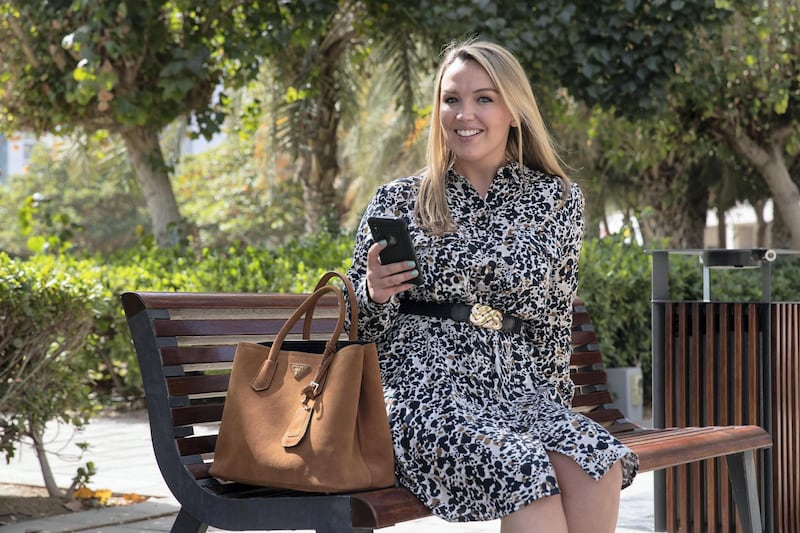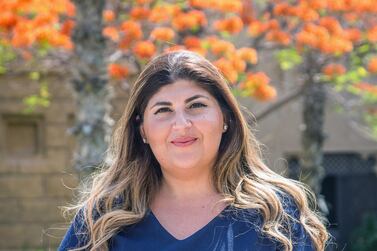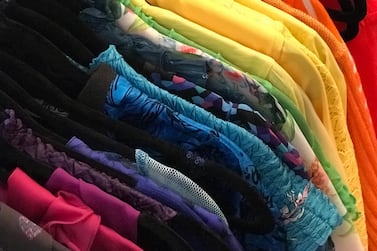Katy Lowes created her pre-owned fashion venture amid “lockdown boredom” and admits her own excessive wardrobe was a catalyst.
Although keen to reduce the environmental impact through clothing re-use, the shrinking space in her apartment initially drove Ms Lowes to launch KLOWES, a Facebook community dedicated to finding new homes for unwanted garments.
“My husband was at breaking point at me for having too many clothes, causing us to outgrow our one-bedroom apartment,” says Ms Lowes, who lives in Dubai’s Jumeirah Lakes Towers.
The Briton, a law firm employee, turned to local classifieds website Dubizzle, but became frustrated by “silly offers” for her unused dresses.
“I then turned to Facebook and realised there were lots of pre-loved furniture groups but not too many for pre-loved fashion,” adds Ms Lowes, 30.
So, she launched KLOWES and within a week, had more than 1,500 members. In the space of six months, that number had grown to 6,500.
Having confirmed the extent others were seeking to buy and sell fashion items, Ms Lowes recently launched a dedicated website, with an app to follow, “with the view that recycled fashion is hip, funky and on-trend”, she explains.
“I really want people to start being creative, perhaps creating their own line of clothing from re-worked pre-loved clothes, not just relying on fast fashion easily purchased in the malls … for people to realise it’s OK to be different and not follow the crowd.”
KLOWES arrives at a time when the pandemic is threatening jobs, squeezing salaries and many residents are looking to curb spending or find ways to boost income.
The global pre-loved sector has grown significantly as people liquidate unwanted items – or look to continue buying quality clothes, but at reduced prices.
The UAE has followed this trend, with the likes of The Luxury Closet and RETOLD both reporting growth.
Ms Lowes, who anticipates her Facebook community will also join the KLOWES website and app, says she has seen a “dramatic change in attitude” towards buying and selling pre-loved clothes in recent months.
“Some because they are suffering from redundancies and cannot afford luxuries they once were used to, others to purely grab a bargain,” says Ms Lowes, who admits she too has revised her general spending habits in the shadow of Covid-19.
"It changed everybody's mentality and helped put things into perspective on what really mattered – and clothes/fashion was at the back of the queue when family, friends, loved ones and health are thrown into the equation.
“The shame or embarrassment that once followed buying pre-loved clothes has disappeared.”
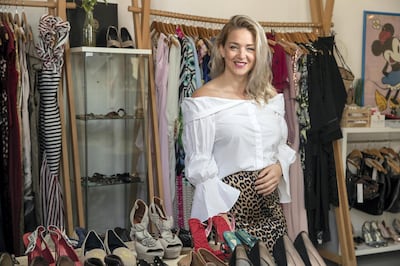
Sian Rowlands has been “championing pre-owned fashion” in the UAE for a decade and reports a steadier uptake and change of mindset surrounding the used fashion segment.
Her resale brand, RETOLD, grew from a need to make money, alongside fiscal pressure from a thriving shopping habit.
“I was struggling to pay rent on my apartment despite having a comfortable income and, after deciding to rent out my spare room and doing a wardrobe cleanout, I realised why,” says Ms Rowlands, 39.
“I was a shopaholic and my fashion consumerism had snuck up on me and set me back years in terms of savings.”
A fan of second-hand shops in her native England, Ms Rowlands began hosting popular monthly pop-up shops in 2011. Four years ago, she quit a successful design career to launch RETOLD full-time and opened a physical boutique in Al Quoz, Dubai.
“I knew I wasn’t the only person in Dubai spending more on fashion than I could afford,” she says. “In fact, looking around, I knew it was such a common problem that I had a business concept on my hands.”
Her shop footfall divides equally between returning and new customers. And 2020 only enhanced that.
“Not only did we see a rise in demand for our concept in general, we also saw a huge increase in people decluttering wardrobes and bringing unwanted items.
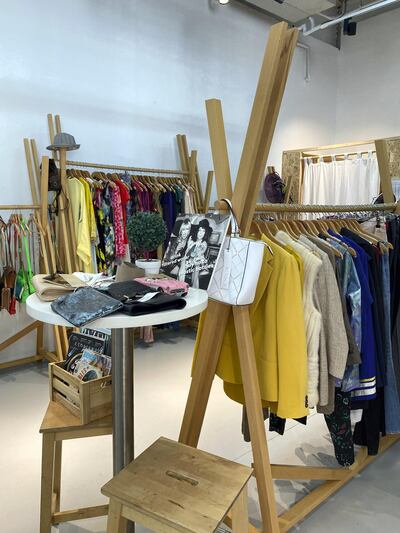
“During the lockdown [March 2020] people took time to edit their homes … in a more conscious mindset, so really thought through how they had a lot of unnecessary wardrobe clutter.
“Our service was in huge demand and we had the opportunity to increase stock levels with lower risk, while being highly selective.”
RETOLD anticipated the influx of sellers over the lockdown, as well as an influx in new “conscious shoppers” when restrictions eased.
Ms Rowlands says the latter comprises two types of people; some experiencing more mindful, less environmentally impactful shopping, and others sampling more “financially thrifty” buying methods.
The brand’s product mix ranges from high street – aiding RETOLD’s own battle against fast-fashion consumption by extending product lifespan – through to designer and luxury brands for men and women.
RETOLD also sells vintage clothing, cameras and artwork, with everything sourced globally thanks to the UAE’s diverse population.
Ms Rowlands says there are many positives for secondhand shopping.
“You have the financial benefit to the shopper – our price point is approximately 75 per cent less than in traditional retail,” she says. “And the financial benefit to the seller, making money back on clothes they already paid for.”
Where once the likes of RETOLD was niche, its retail concept is becoming mainstream, both locally and beyond.
Among the competition is Fashion Rerun, a website trading used high street choices for men, women and children, and other physical outlets, including charity-orientated newcomer The Thrift Store on the Palm Jumeirah and high-end resale boutique Garderobe on Dubai’s Jumeirah Beach Road.
The Luxury Closet is another established pre-loved digital retailer that operates in the high-end fashion, accessories and homeware thread.
The online boutique offers instalment options for more costly purchases such as Rolex and Piaget watches and talks of a “resale revolution”.
“Consumers’ luxury shopping habits have definitely changed due to the pandemic with a mindset shifted more towards longevity of luxury, consideration of what ownership of luxury really stands for, along with the impact this has on the environment,” says Luxury Closet chief executive Kunal Kapoor.
“This new mentality is led by millennials and Gen Z, who think differently about sustainability, have a louder voice across social platforms and the power to affect their family’s decisions, too.”
Recent studies suggest the global secondhand market could touch $64 billion in the next five years.

In fact, in 2019, the resale sector grew 25 times faster than the overall retail market, says American Alyssa Mariano.
She is the co-founder of Bazaara, a mobile-first, peer-to-peer marketplace app enabling people to turn clear-outs into cash, including clothes, accessories and home goods – and for others to find potential bargains on a more sustainable path to looking good.
“These numbers have been amplified for online marketplaces during the pandemic as people shop and list from the comfort of their homes,” says Ms Mariano.
“The pandemic has shined a spotlight on budget-friendly and conscious shopping as well as the damage certain industries have on the environment, so more and more people are transitioning to conscious shopping.”
Ms Mariano also previously attempted to sell clothes “through other avenues”. She says she wanted to bring the buzz of “finding a steal” at the mall or thrift store to online shoppers in a “stay-home” era, while reducing stock bound for landfill.
Bazaara’s founders also aspired a “seamless transaction and experience” for both buyers and sellers, including shipping costs in their “lowest in the market” fees.
Ms Mariano says making money from unwanted items and picking up products for less are equally meaningful elements for the platform, which had 2,500 users within four weeks of going live in November.
“The pandemic has brought a lot of hardships and challenges to people around the world, which has forced many to relook at budgets and the way they spend,” says Ms Mariano.
“Secondhand shopping not only provides an option for people to buy quality brands for less, but also provides users with an opportunity to earn extra cash by listing their gently used items for sale.”
Also the founder of Marketelier, a boutique marketing and creative communications agency, and previously a PR manager, Ms Mariano sees Bazaara as creating a dialogue around so-called circular fashion and shifting consumer focus from new to pre-loved.
“The fashion industry is the world’s third-largest polluter and, unfortunately, only 20 per cent of clothing is reused or upcycled,” she adds.
“It is gratifying to know Bazaara is helping to positively impact these numbers by offering a place for people to resell items, instead of throwing them away.”
It’s a sentiment echoed by Ms Lowes, who reduced her own clothing collection, which stretched across three wardrobes and 100-plus pairs of shoes.
"Something needed to change and I'm sure there are many girls in Dubai with the same problem," she says.
“I decided to start KLOWES to make a positive change on fashion that would help the planet, reduce waste and help people recycle their fashion and maybe even be creative by upcycling. People are more aware, and want to improve their impact.”
